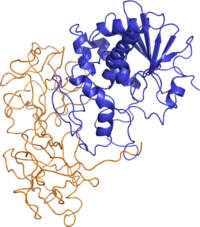
Photo from wikipedia
Auranofin is a gold (I)-containing compound used for the treatment of rheumatic arthritis. Auranofin has anticancer activity in animal models and is approved for clinical trials for lung and ovarian… Click to show full abstract
Auranofin is a gold (I)-containing compound used for the treatment of rheumatic arthritis. Auranofin has anticancer activity in animal models and is approved for clinical trials for lung and ovarian carcinomas. Both the cytosolic and mitochondrial forms of the selenoprotein thioredoxin reductase (TrxR) are well documented targets of auranofin. Auranofin was recently reported to also inhibit proteasome activity at the level of the proteasome-associated deubiquitinases (DUBs) UCHL5 and USP14. We here set out to re-examine the molecular mechanism underlying auranofin cytotoxicity towards cultured cancer cells. The effects of auranofin on the proteasome were examined in cells and in vitro, effects on DUB activity were assessed using different substrates. The cellular response to auranofin was compared to that of the 20S proteasome inhibitor bortezomib and the 19S DUB inhibitor b-AP15 using proteomics. Auranofin was found to inhibit mitochondrial activity and to an induce oxidative stress response at IC50 doses. At 2-3-fold higher doses, auranofin inhibits proteasome processing in cells. At such supra-pharmacological concentrations USP14 activity was inhibited. Analysis of protein expression profiles in drug-exposed tumor cells showed that auranofin induces a response distinct from that of the 20S proteasome inhibitor bortezomib and the DUB inhibitor b-AP15, both of which induced similar responses. Our results support the notion that the primary mechanism of action of auranofin is TrxR inhibition and suggest that proteasome DUB inhibition is an off-target effect. Whether proteasome inhibition will contribute to the antineoplastic effect of auranofin in treated patients is unclear but remains a possibility.
Journal Title: Biochimie
Year Published: 2019
Link to full text (if available)
Share on Social Media: Sign Up to like & get
recommendations!